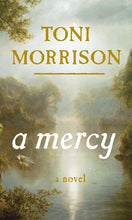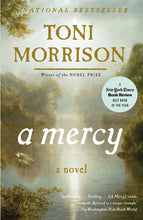NATIONAL BESTSELLER • In “one of Morrison’s most haunting works” (The New York Times), the acclaimed Nobel Prize winner reveals what lies beneath the surface of slavery. But at its heart, like Beloved, it is the story of a mother and a daughter—a mother who casts off her daughter in order to save her, and a daughter who may never exorcise that abandonment.
One of the New York Times’s 100 Best Books of the 21st Century
In the 1680s the slave trade in the Americas is still in its infancy. Jacob Vaark is an Anglo-Dutch trader and adventurer, with a small holding in the harsh North. Despite his distaste for dealing in “flesh,” he takes a small slave girl in part payment for a bad debt from a plantation owner in Catholic Maryland. This is Florens, who can read and write and might be useful on his farm. Rejected by her mother, Florens looks for love, first from Lina, an older servant woman at her new master's house, and later from the handsome blacksmith, an African, never enslaved, who comes riding into their lives.
BIO
Toni Morrison is the author of eleven novels, from The Bluest Eye (1970) to God Help the Child (2015). She received the National Book Critics Circle Award, the Pulitzer Prize, and in 1993 she was awarded the Nobel Prize in Literature. She died in 2019.
REVIEWS
A NEW YORK TIMES BOOK REVIEW BEST BOOK OF THE YEAR
“Spellbinding. . . . Dazzling. . . . [A Mercy] stands alongside Beloved as a unique triumph.” -- The Washington Post Book World
“A Mercy conjures up the beautiful, untamed, lawless world that was America in the seventeenth-century with the same sort of lyrical, verdant prose that distinguished [Beloved]. . . . A heartbreaking account of lost innocence and fractured dreams. . . . One of Morrison's most haunting works yet.” -- Michiko Kakutani, The New York Times
“Luminous and complex. . . . Some of Morrison's best writing in years.” -- Time
“Magnificent . . . As with all Morrison’s finest work, A Mercy compellingly combines immediacy and obliquity. Its evocation of pioneer existence in America surrounds you with sensuous intensity. . . . An attack by a bear is described with thrilling power. . . . Idioms have potent directness, too. . . . Rich knowledgeability about 17th-century America is put to telling effect. Voices speak to you as if you were there. . . . The book keeps you vividly aware of the vital human individuality that racism’s crude categorizations are brutally trying to iron out. . . . A stark story of the evils of possessiveness and the perils of dispossession emerges slantwise. Hints, suspicions, secrets, ambivalences, scarcely acknowledged motives and barely noticeable nuances serve as signposts to enormities and desperations: around slavery’s large-scale uprootings, Morrison spotlights individual instances of loss (orphans and outcasts are, as often in her fiction, much in evidence; compensatory alliances they form are warmly portrayed). A Mercy is so enthralling that you’ll want to read it more than once. On each occasion, it further reveals itself as a masterpiece of rewarding complexity.” -- Peter Kemp, The Sunday Times (London)
“In [A Mercy,] a mother chooses to give her daughter to a stranger, the man who will ‘own’ her, in hopes that she’ll find a better life. It is this act from which the book derives its title, but it is, of course, an ambivalent gesture whose tragic resonance will be slowly unveiled. . . . Morrison here is seeking some deeper truth about what she once called ‘the presence of the unfree within the heart of the democratic experiment.’ Some regard this novel as a kind of prelude to Beloved, but the author has even more provocative ideas at play. . . . In writing about the horror of slavery, she finds a kind of ragged hope.” -- Renée Graham, Boston Sunday Globe
“[A Mercy] examines slavery through the prism of power, not race. Morrison achieves this by setting A Mercy in 1680s America, when slavery was a color-blind, equal-opportunity state of misery, not yet the rigid, peculiar institution it would become. . . . Morrison doesn’t write traditional novels so much as create a hypnotic state of poetic intoxication. You don’t read A Mercy, you fall into a miasma of language and symbolism. [It] offers an original vision of America in its primeval state, where freedom was a rare commodity.” -- Deirdre Donahue, USA Today
“[Toni Morrison] bound[s] into literature with her new book as if it were the first time, with the spry energy of a doe. A Mercy . . . is that beguiling and beautiful, that deftly condensed, that sinewy with imaginative sentences, lyric flight and abundant human sensitivity. . . . Finely hammered phrases repeatedly come off the anvil, forming a story as powerful as the many she has shaped before. Elements of this writer’s art from way back remain part of her achievement here. Like a mighty telescope perched on a contemporary plateau, Morrison draws in signals, moods, torments, exhilarations from African American life and history . . . Morrison mixes the verbal music of an era with idiosyncratic wisdom, delivered indirectly rather than ex cathedra, recalling omniscient Russian masters without imitating them. . . . Along the way come moments whose artistry freezes one’s page-turning. Morrison’s tactile reports rivet . . . What’s the opposite of ‘lazy’ in a fiction writer’s style and research? Industrious? Indefatigable? Morrison wears her knowledge lightly, yet every page exhibits her control of [the 17th century’s] objects and artifacts, its worries and dangers. She surrounds A Mercy’s more fanciful arabesques with a broad border of realism. . . . A book as masterfully wrought as A Mercy behooves its author to swagger. Go to it, Ms. Morrison.” -- Carlin Romano, The Philadelphia Inquirer
“A grand tragedy writ in miniature . . . Women, men, Africans, Native Americans, whites, masters, slaves–all are cast into the hard world that is the New World in Toni Morrison’s lustrous new novel. In the same way, the Nobel Prize winner casts us into her hypnotic, many-voiced narrative set in the 17th century in a nation yet unformed. . . . We’re beguiled from the opening sentence: ‘Don’t be afraid.’ The speaker is Florens, black, barely out of childhood, a slave but literate, whose eager-to-please ways and lyrical language endear her to us and to the Virginia household of Jacob Vaark. . . . The subject of [A Mercy] is slavery, and [Morrison] brings to it, along with some of her most haunting language, elements of history and mythos. . . . A Mercy is kindled by characters who are complex and vulnerable, full of what she describes in Beloved as ‘awful human power.’ . . . This novel’s release coincides with the presidential election of Barack Obama, a shining moment in our country’s history of which Morrison’s characters can barely dream.” -- Ellen Kanner, The Miami Herald
“Themes of slavery and grief, of women’s struggles to escape the bitterness of the captive world, are at the center of Morrison’s work. They also lie at the heart of her new novel, A Mercy, which looks to history [as in Beloved]–in this case, the 1680s and 1690s–to explore the agonies of slavery among the settlers of the New World. Such a description makes Morrison’s novel sound far too pat, however; it slights the poetry and breadth of her work. Yes, A Mercy is about slavery, but in the most universal sense, meaning the limits we place on ourselves as well as the confinements we suffer at the hands of others. . . . [It is] a work of poetry and intelligence, and a continuation of what John Updike has called [Morrison’s] ‘noble and necessary fictional project of exposing the infamies of slavery and the hardships of being African American.’ The story assumes even greater metaphorical power at this particular moment, with the election of Barack Obama as our first African American president.” --Judith Freeman, Los Angeles Times Book Review
[H] Knopf Publishing Group / November 11, 2008
0.88" H x 9.56" L x 5.88" W (0.85 lbs) 176 pages
[P] Vintage / August 11, 2009
0.7" H x 7.9" L x 5.2" W (0.46 lbs) 208 pages



